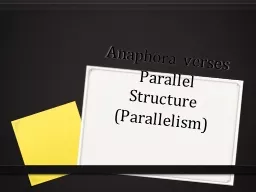PPT-Parallelism in the Standard C++: What to Expect in C++ 17
Author : lois-ondreau | Published Date : 2016-07-19
Artur Laksberg arturlmicrosoftcom Visual C Team Microsoft September 17 2014 Agenda Parallel Fundamentals Task regions Parallel Algorithms Parallelization Vectorization
Presentation Embed Code
Download Presentation
Download Presentation The PPT/PDF document "Parallelism in the Standard C++: What to..." is the property of its rightful owner. Permission is granted to download and print the materials on this website for personal, non-commercial use only, and to display it on your personal computer provided you do not modify the materials and that you retain all copyright notices contained in the materials. By downloading content from our website, you accept the terms of this agreement.
Parallelism in the Standard C++: What to Expect in C++ 17: Transcript
Download Rules Of Document
"Parallelism in the Standard C++: What to Expect in C++ 17"The content belongs to its owner. You may download and print it for personal use, without modification, and keep all copyright notices. By downloading, you agree to these terms.
Related Documents














